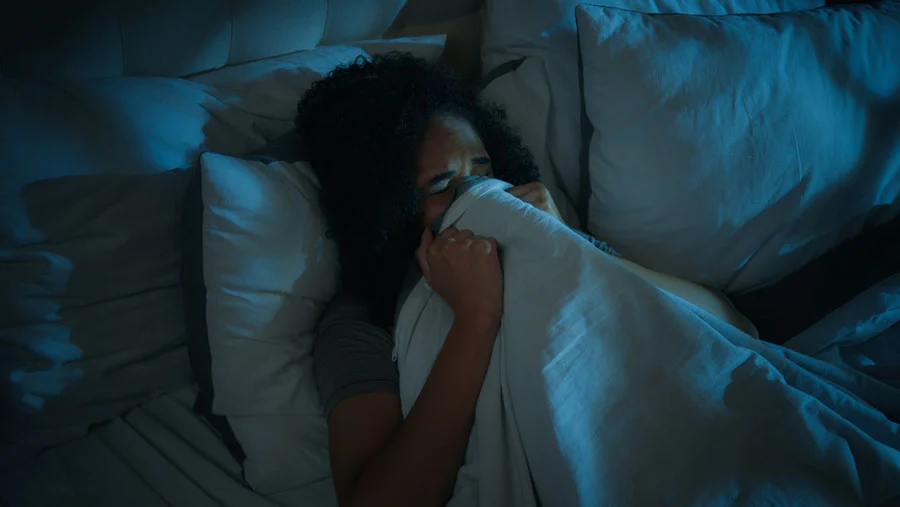Overcome Nightmares from CPTSD with Our Support at Catalina
If you have found our resource, whether for yourself or in looking for a loved one, you are likely already familiar with the reality: Complex post-traumatic stress disorder, also called C-PTSD or Complex PTSD, can be disruptive to your daily life, relationships, and overall health. And nightmares or night terrors often play a role in some or all of the disruptions.
With up to 71% of those with PTSD experiencing nightmares, you’re not alone if you face disturbing dreams or nightmares. Our resource and team at Catalina are here to support recovery from Complex PTSD and nightmares and support a return to health and a full night’s sleep!
It is crucial to understand that those who endure traumatic experiences can recover and reclaim their lives from C-PTSD symptoms, including sleep disruptions and nightmares.
Our team has seen people heal and create a stable, enjoyable life with relaxation and relief time and time again. So, what should you know? Let’s talk about the connection between sleep difficulties and Complex PTSD first. Then, we’ll go over relaxation techniques and tips you can use to reduce nightmares at home, as well as the role of therapy and other treatment options.
Get a Confidential Trauma and PTSD Assessment
The Connection Between Sleep Disturbances and C-PTSD
Although it may seem like the whole world sleeps well if you are suffering from traumatic nightmares, one of the more common symptoms of PTSD aside from flashbacks is sleep disturbance. For example, disturbance of sleep patterns, like early waking or finding it difficult to fall asleep at night. Nightmares are another possible symptom, and they are not uncommon either.
Specifically, nightmares are listed under the “re-experiencing” category of PTSD symptoms used for diagnosis in the Diagnostic and Statistical Manual of Mental Disorders, alongside dissociative symptoms like flashbacks.
The distressing dreams a person with PTSD or CPTSD experiences might be associated with a traumatic event itself or emotions associated with the event. For example, experiencing chronic trauma in the form of sexual abuse during childhood (or adulthood as well) could mean that a person endures the emotional intensity of going through it again in their sleep, and the images they see could feel very real. You can see where this is extremely disruptive and not something anyone deserves to go through.
Some people with C-PTSD will also have recurring dreams where they go through traumatic situations and affiliated emotions over and over again. We’ll look more closely into why this is, and address ways of setting a routine that can help overcome these nighttime trauma reminders.
Complex PTSD Nightmares: Causes and Risk Factors

What causes C-PTSD in the first place? If you have experienced ongoing or chronic trauma, you are at risk for C-PTSD. For example, prolonged childhood abuse is a common cause of C-PTSD. People with C-PTSD may experience additional or intensified symptoms.
Not everyone who endures a traumatic event develops PTSD, but developing PTSD or not is not something that a person can control. Risk factors for PTSD and C-PTSD can include but aren’t limited to experiencing trauma at a young age, gender, and lower levels of social support.
Other mental health conditions, like anxiety, are also associated with nightmares. There are high rates of co-occurring mental health conditions in C-PTSD survivors. In treatment, people with co-occurring disorders can get help for both to aid whole-person well-being, which is one of the features our treatment programs emphasize.
Get Effective Trauma Treatment Options at Catalina
Several Techniques for Reducing Nightmare Frequency
While seeing a mental health provider for professional help is important, and we will talk about treatment options shortly, self-care matters for all of us. Careful attention to self-care and coping skills for stressful situations can be important for those with PTSD or C-PTSD. Here are some self-care activities that can support relief from nightmares and other sleep disturbances.
- Practicing good sleep hygiene.
- Creating a safe and calming sleep environment.
- Using relaxation techniques before bed.
- Engaging in regular exercise to improve overall sleep quality.
Restorative sleep is crucial for overall mental and physical health. Sleep deprivation is associated with daytime sleepiness, an increased risk of car crashes, mood swings, worsened depression symptoms, trouble focusing, anxiety, and other consequences.
Developing Effective Coping Mechanisms for C-PTSD

It’s essential that those with Complex PTSD have a strong toolkit of coping skills. Healthy and accessible coping mechanisms like mindfulness, relaxation, and supportive daily routines can be beneficial for those with Complex PTSD.
Mindfulness and Relaxation Techniques
Mindfulness and relaxation techniques, such as deep breathing exercises, meditation, and guided imagery, have all been shown to have the potential to help reduce stress and anxiety in research. They’re a good way to wind down, stay present, and relax your nervous system. They can also help you cope with symptoms like intrusive thoughts more effectively.
The Importance of Routines in Managing C-PTSD and Nightmares
Creating and following a daily routine can provide a sense of stability and control. It can also be helpful to have routines to fall back on during times when trauma triggers are high. Stability can be a crucial part of establishing a sense of safety in your body and mind after past trauma. To support healthy sleep, create a structured schedule that includes:
- Good sleep hygiene and regular sleep patterns.
- Stress management and relaxation techniques.
- Balanced, consistent meals and snacks.
- Enjoyable physical activity.
It’s ideal to pair these strategies with appropriate treatment options like evidence-based therapies. Treatment can help you process trauma, build new daily patterns that support trauma recovery, and learn coping skills from qualified mental health professionals.
Our Evidence-Based Treatment Methods for CPTSD and Nightmares

Research shows us that there are effective treatment options for PTSD and CPTSD, nightmares, and sleep disturbances. Here are some of the most commonly recommended or research-backed treatments that can help you get through the effects of traumatic experiences.
Forms of Therapy Used to Treat Complex PTSD
Therapists specializing in trauma-focused approaches can help individuals develop coping strategies, improve emotional regulation, and work through the effects of trauma on their daily lives, such as nightmares and poor sleep. Here are some common therapies used for PTSD and Complex PTSD treatment.
- Prolonged Exposure Therapy: A therapeutic modality that involves gradually exposing people to the source of their trauma in a safe and controlled environment. This type of therapy has been shown to be effective in reducing PTSD symptoms, including nightmares.
- Cognitive Behavioral Therapy (CBT): A form of therapy that helps people establish new, healthy, and adaptive thought patterns. Trauma-focused CBT was designed specifically to help those who have experienced traumatic events.
- Eye Movement Desensitization and Reprocessing (EMDR): A kind of therapy that uses bilateral stimulation (usually in the form of eye movements) to reduce the intensity and effects of emotions associated with traumatic memories.
Catalina Behavioral Health’s programs use a combined approach of multiple therapies and other holistic treatments. All therapeutic interventions and related treatments help those who have endured a traumatic event in unique ways. Coping skills, awareness, reduced reactions to triggers, and healthy thought patterns can go a long way in the healing process.
What are the Medication Options for Complex PTSD?
In addition to trauma-focused therapy, medication may be prescribed as part of a treatment plan for C-PTSD. Antidepressant medications, such as selective serotonin reuptake inhibitors (SSRIs), can help manage symptoms of depression, anxiety, and intrusive thoughts commonly associated with C-PTSD. Other medication classes might also be used, depending on your unique needs.
Up To 100% of Rehab Costs Covered By Insurance
Get Help for Complex PTSD and Nightmares at Catalina Today
At Catalina Behavioral Health, our clinicians treat mental disorders like PTSD and C-PTSD comprehensively through a combination of effective treatment methods. We create individualized treatment plans for clients experiencing the effects of chronic trauma, including nightmares, sleep disturbances, and other symptoms.
To get in touch, call Catalina Behavioral Health’s admissions line for a confidential consultation today. We’re here to verify your insurance coverage or answer any questions you might have about treatment.
FAQs Regarding Complex PTSD and Nightmares
What does a PTSD nightmare look like?
A PTSD nightmare will often be intense, with vivid and disturbing imagery. PTSD or C-PTSD nightmares can disrupt sleep and can be highly distressing for the person who experiences them.
Do people with complex PTSD have nightmares?
While not everyone with Complex PTSD will have nightmares, those with PTSD and CPTSD are more likely to have nightmares compared to the general population.
How do people with complex PTSD behave?

Nightmares or frightening dreams and sleep difficulties are just two possible symptoms of CPTSD. Other common symptoms can include difficulty in interpersonal relationships (usually marked by trouble creating and maintaining healthy relationships — attachment style may affect this), hypervigilance, flashbacks, negative self-concept or distorted sense of self, and affective dysregulation or mood-related symptoms.
That said, all people with Complex PTSD behave and experience symptoms differently. While it can always impede daily functioning, mood, self-perception, sleep, and your general level of stress, some people internalize or hide symptoms more than others. This does not mean that a person doesn’t need treatment. Enduring CPTSD symptoms in silence is not the answer.
What happens if C-PTSD goes untreated?
It’s vital to understand that time doesn’t make Complex PTSD go away on its own. When C-PTSD goes untreated, people continue experiencing disruptive symptoms that would often respond to or reduce with treatment.
Evidence-based treatments for trauma include but aren’t limited to cognitive behavioral therapy, cognitive processing therapy, eye movement desensitization and reprocessing, exposure therapy, and medications.
References
- https://www.ncbi.nlm.nih.gov/pmc/articles/PMC5078833/
- https://pubmed.ncbi.nlm.nih.gov/31268218/
- https://www.nimh.nih.gov/health/topics/post-traumatic-stress-disorder-ptsd
- https://www.ncbi.nlm.nih.gov/pmc/articles/PMC6263296/
- https://www.apa.org/ptsd-guideline/treatments/eye-movement-reprocessing
- https://www.apa.org/ptsd-guideline/treatments





